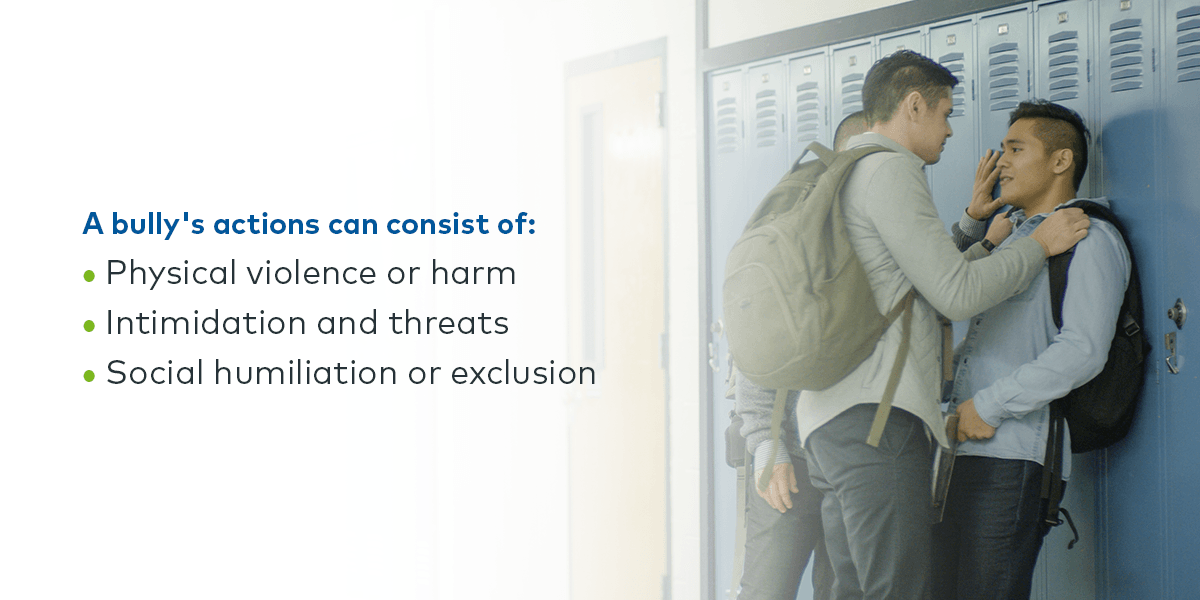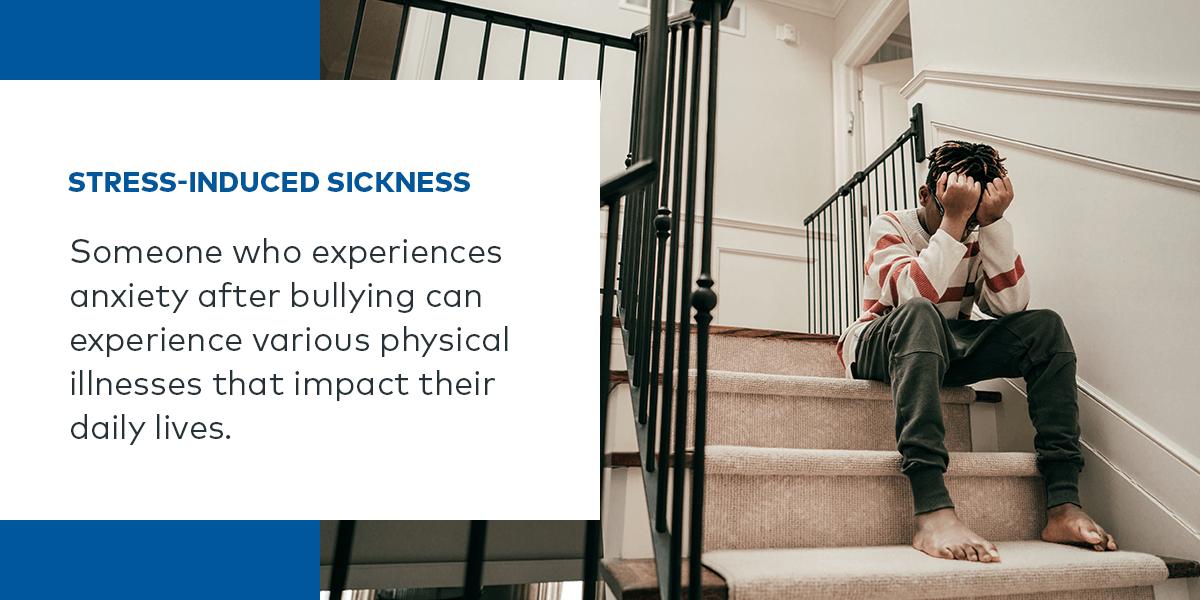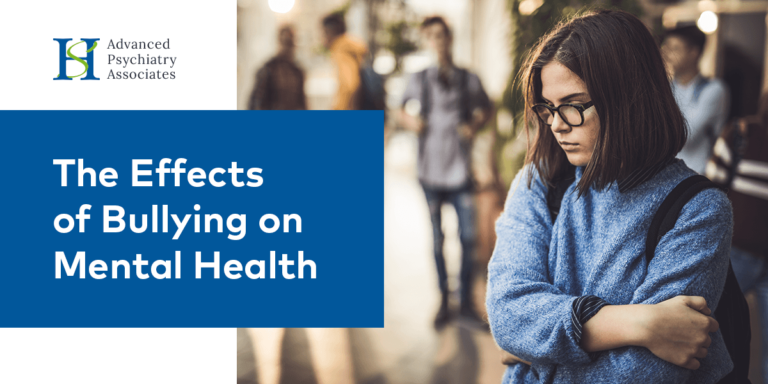Bullying continues to be a prominent issue for kids and teens. In 2020, one in five high school students stated they were victims of bullying at school. And bullying doesn’t only occur in schools. It can happen in person or online (cell phones, social media, etc.) , and the ramifications can have a ripple effect.
The short- and long-term effects of bullying leave an impression on both parties involved. While schools offer support and resources and parents can help, the benefits of speaking to a professional are valuable.
Understanding how bullying impacts life and the state of someone’s mental health can provide strategies and solutions.

What Is Bullying?
Most people have a general understanding of what behaviors constitute bullying. The most recent definition of the action describes it as a type of violence inflicted by an individual or group that threatens kids’ or teens’ well-being. Many factors can lead one person to bully another, but a power imbalance lies at this issue’s root. This dichotomy can either be an actual occurrence — such as wealth, physical size or popularity at school — or a perceived problem.
A bully’s actions can consist of:
- Physical violence or harm
- Intimidation and threats
- Social humiliation or exclusion
Learning how bullying affects students mentally and possible signs to watch for are essential for resolving the problem at its root.
How Can Bullying Affect Mental Health?
Bullying’s repercussions can affect your mental, emotional and physical health. The short- and long-term effects can impact your social life and emotional well-being, and, in some cases, result in physical injuries or death.
The victim and the bully experience the significant impacts of bullying, including being more likely to experience mental or behavioral issues.
Bullying also affects bystanders, including:
- People who proactively attempt to stop the bullying
- People who are too intimidated or afraid to stand up and intervene
Bullying can impact the second group by increasing their risk for mental health problems and affecting their academic achievements. The first group is more likely to have positive outcomes from standing up to bullying, like increased confidence or self-esteem. The victim and all those around them feel bullying’s significance.
What Does Bullying Do to Your Mental Health?
Bullying’s effects vary, depending on the impacted person and whether they are the victim. While the effects of physical bullying on children are painful, any injuries sustained usually heal faster than the impact all types of bullying have on mental health. It can cause long- and short-term issues that hinder the victim’s and the bully’s lives. These two parties can both experience the psychological consequences of bullying.
Short-Term Mental Health Effects of Bullying on Health
How does bullying affect students mentally? Bullying’s immediate or short-term effects are typically straightforward and noticeable. These can be mental, emotional or physical.
Here are a few examples of the short-term effects of bullying.
- Mental health problems and symptoms: Victims may show signs of poor mental health, and the emotional effects of bullying may become increasingly severe. Most bullies’ targets notice anxiety or depression symptoms after one or more incidents.
- Psychosomatic issues: This effect describes health issues with no medical cause, like upset stomachs, headaches and muscle pain. A person may experience these symptoms at any time, but usually before the school day.
- Sleep problems: Victims can experience a range of sleep issues, like trouble falling or staying asleep. These kids are also more likely to have nightmares compared to their peers.
- Poor academic performance: A student’s grades may begin to suffer because of bullying, which can occur due to trouble concentrating or skipping school to avoid their bully.
- Socialization issues: A significant issue stemming from bullying is social isolation or exclusion from peers. Bullying victims may fall to a lower tier in the school’s social structure and struggle to make or keep friends.
Other short-term effects of bullying on the victim include:
- Eating habit changes
- Skipping or avoiding school
- Low confidence and self-esteem
- Feeling shameful
- High risk of illness
It’s hard to empathize with a bully, but it’s essential to understand the root of their behavior. Parents, guardians and school officials should learn the reasons and warning signs for the bully’s actions and how they can affect their life.
The short-term consequences of bullying behavior include:
- High risk of absenteeism
- Poor academic performance
- Difficulty maintaining relationships
- More susceptibility to substance abuse

- Long-Term Effects of Bullying on Health
- If bullying persists, it can lead to long-term effects and severe problems that are more difficult to handle. The challenges can be debilitating for both the victim and the bully if nobody resolves the issue or intervenes with help.
- Here are some of the long-term mental health issues and consequences of bullying on the victim.
- Stress-induced sickness: The physical impact of bullying can carry on throughout a person’s life. Someone who experiences anxiety after bullying can experience various physical illnesses that impact their daily lives.
- Family impact: The entire family can experience bullying’s long-term effects. Parents may feel guilty or helpless in navigating this process, and siblings may feel sad if their brother or sister is behaving differently or not spending time with them.
- Depression and anxiety: Mental health symptoms can grow into a more chronic problem.
- Risk of suicidal thoughts: The victim and the bully are at risk for suicidal ideation or suicide-related behaviors. The CDC describes the relationship between bullying and suicide and how it affects young people.
- Maintaining friendships: Bully victims can have a difficult time maintaining and establishing friendships. Establishing trust with people may also be a challenge.
- Other long-term effects include:
- Poor health habits
- Self-harm
- Substance use
- PTSD
- Eating disorders
- Panic attacks
- The long-term effects of bullying for the bully include:
- High risk for child or spousal abuse
- Elevated risk for social and behavioral issues
- Substance use
- Less likely to find and keep a job
Quality Mental Health Counseling From Advanced Psychiatry Associates
Navigating bullying can be a tricky process. Whether a person is a target or a bullier, it’s beneficial for both parties to seek psychological help to improve their mental health after bullying.
If you’re looking for mental health counseling to help navigate bullying, reach out to Advanced Psychiatry Associates in Sacramento. We offer a range of mental health services at our full-service psychiatric facility. Our mental health professionals have years of experience and knowledge to provide quality care to each patient to improve their lives. Schedule an appointment today and learn more about our services.







